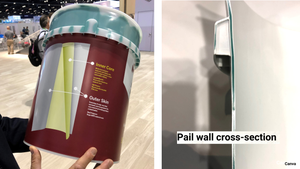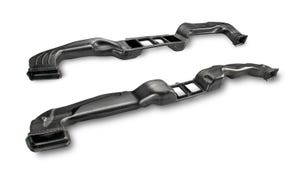Industry mergers: What does it all meab?
September 27, 1998
When Moll Industries announced in July its merger with its recent purchase, Anchor Advanced Products (Knoxville, TN), the resulting quake registered about a 4.2 on the Richter Scale. The new company is now the sixth largest non-automotive custom injection molder in North America, according to one spokesman.
Originally, Moll purchased Anchor last March with no intention of combining the two operations. After a few months of working closely together, however, company officials began to realize a merger would be beneficial to everyone involved, primarily customers of the two entities.
"This will enable Moll to broaden our capabilities as a full-service plastics company with an international platform," says George Votis, chairman and CEO of Moll, which is headquartered in New York. "From product design through project implementation and delivery, this will establish our company as the new global player, well positioned to meet the full array of our customers' needs."
'Everything that Makes Sense'
Since Votis's entry into the plastics arena in 1990, his acquisitions have typically been small, family-owned injection molding companies. Some of his early acquisitions, for example, included Moll and Plasticrafters, which became Moll Plasticrafters; TexTek Plastics in San Antonio; and Quality Plastics, a family-owned custom molding company in Newberg, OR.
Anchor is the largest company Votis has purchased so far. He describes Anchor as "a good fit in terms of the strategy for my company." Does that mean Votis is moving away from interest in smaller companies?
"I look at everything that makes sense," says Votis. "That includes small, family-owned businesses as well as larger companies."
An example came on August 3 when Votis announced the acquisition of Gemini Plastics Services, a custom molding operation in Davie, FL. Gemini reported revenues of $21 million in 1997. Votis says Gemini fit the profile of the type of company he looks for.
He says size isn't as important as the specific factors a company can bring to the table in terms of a specific customer base, a geographic location, or strength in an industry segment. Moll's strategic goal is to be a diverse player across many markets, offering a smorgasbord of services in many locations globally. Companies Votis looks at to purchase must fit somewhere in that strategy.
Gemini is a good example. "It had multiple owners, fantastic management, a good asset base, and very good technology," explains Votis. As another plus, the company is also focused on three key market segments: medical, telecommunications, and the military. It has blue chip customers in each who are seeking global suppliers.
"Smaller companies might have two or three customers that are global players," explains Votis. "We consider our ability to cross-sell these customers to our other locations, so we can supply them from many locations. This is an entirely different dynamic, but it's really about servicing the customer."
In that respect, Anchor offers a diverse customer base with multiple plant sites. The company produces a variety of products, including applications in the cosmetics industry such as lipstick containers, nail polish applicators, compacts, and custom mascara packages; medical devices; toothbrushes; scrub brushes; and other consumer items. Anchor operates nine facilities throughout North America, including a plant in Mexico, and reported sales of $162 million in 1997.
Thinking Globally
Votis believes big companies want to do business with larger suppliers that can serve all aspects of their manufactured product requirements from a variety of locations worldwide. To that end, Votis also recently purchased Somomeca Group and Hanning Plastics, two leading European suppliers of injection molded components and services with 10 facilities through France, the U.K., Portugal, and Germany.
Looking through a global lens, Votis sees that unless a company has broad capabilities and multiple plant sites, they won't be poised to capitalize on their customers' expansion into the global marketplace. "We, as a company, are now positioned to serve customers globally."
Will there still be room in the future for the small, single-site, family-owned molding company?
"Of course," he replies. "This industry is very slow to consolidate, and it's so large there's room for everyone to play.
"However, there's a role to be filled, and that role is the one-stop shop where a customer can have requirements filled from multiple sites and in multiple locations by a single supplier."
Votis says a company the size of his must be strategic in orientation. However, strategy is important to any size company. What advice does Votis have for owners of smaller molding companies to add value to their business?
"Figure out which sandboxes you're playing in, and play in them deeply." In other words, have a strategy, be focused on your market niches, serve them broadly, and serve them well.
In today's economy, will all the mergers and acquisitions hurt the smaller molding companies? "I don't think companies will get hurt because of the merger activity," Votis says. "What will hurt them is if they don't service their customers. Is there really anything more important?"
Contact information |
You May Also Like


